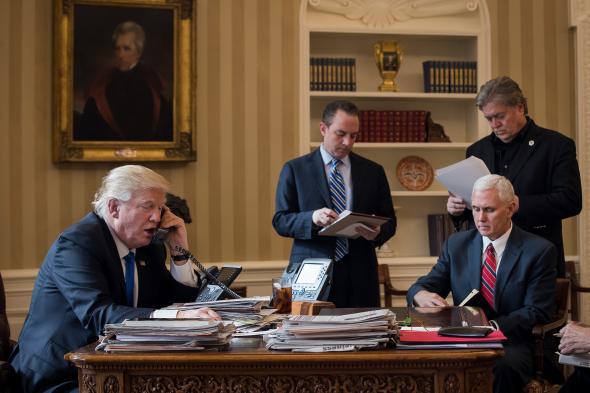Donald Trump met with Russian Ambassador Sergey Kislyak in April, in the heart of his campaign for president. The now-president of the United States has, of course, said he had “zero” involvement with Russian officials during his run, but he did. From all appearances it was a quick meeting, an inconsequential one, as it was far from a secret interaction. The reason we know about the incident is that Damian Paletta of the Wall Street Journal reported on it at the time.*
In a story published on May 13—with Trump having already ascended to being the presumptive GOP presidential nominee—Paletta referenced a VIP reception on April 27 at the Mayflower Hotel. The day before the event, Trump had chalked up electoral wins in Connecticut, Delaware, Maryland, Pennsylvania, and Rhode Island. Trump was in D.C. at the Mayflower to give a foreign policy address when “[a] few minutes before he made those remarks, Mr. Trump met at a VIP reception with Russia’s ambassador to the U.S., Sergey Ivanovich Kislyak,” the Journal reports. “Mr. Trump warmly greeted Mr. Kislyak and three other foreign ambassadors who came to the reception.” “I believe an easing of tensions, and improved relations with Russia—from a position of strength only—is possible, absolutely possible,” Trump said during his speech later. “Some say the Russians won’t be reasonable. I intend to find out.”
The meeting was, essentially, a throwaway line—color—in a larger story about Donald Trump’s confounding affinity for Vladimir Putin. Meeting, apparently briefly, the Russian ambassador wouldn’t have been a particularly big deal if Trump didn’t make it so by being generally unforthcoming about his dealings and interactions with Russia. Trump likely could have gotten away with not recalling the meeting, writing it off as an oversight, if Trump associates one by one hadn’t gotten dinged of late for being misleading about their interactions with the Russians. “I have nothing to do with Russia,” Trump said in February. “Haven’t made a phone call to Russia in years. Don’t speak to people from Russia.”
“The big point here is the president himself knows what his involvement was, and that’s zero,” White House spokeswoman Sarah Huckabee Sanders said last week in response to questions about Trump’s interactions with Russian officials during the campaign. “And I think that he’s the primary person that should be held responsible, and he had no interaction, and I think that’s what the story should be focused on.”
But he did have an interaction. What does it mean? The White House pushed back hard again on Tuesday when coverage of the meeting resurfaced, calling it “disingenuous and absurd.” It seems totally possible that Donald Trump didn’t recognize or know who the Russian ambassador was; it also seems perfectly reasonable that it was a quick handshake in a crowded room that was quickly forgotten. Or perhaps it was something more? The most worrying part of this particular twist—at this point—isn’t that we don’t know the answer, but that the White House didn’t appear to know the answer either. This wasn’t WikiLeaks or a rogue White House Twitter account spilling internal conversations—this was a public event covered by one of the biggest, most influential newspapers in the world. This was Googleable. This was easily findable if the White House did its due diligence and looked before it spoke. The real question at this point is: Why isn’t the White House looking? Or put another way: What isn’t the White House looking for?
*Correction, March 8, 2017: This post originally misspelled Damian Paletta’s first name.
